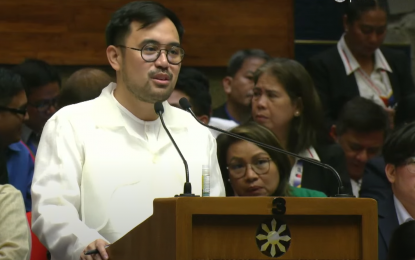
FOOD THRESHOLD. Pangasinan Representative Christopher de Venecia defends the proposed 2025 budget of the Department of Trade and Industry (DTI) before the House plenary on Wednesday (Sept. 18, 2024). De Venecia, as the agency's budget sponsor, said the DTI and National Economic and Development Authority (NEDA) are working together to address concerns over the PHP64 per day food threshold. (Screengrab)
MANILA – The National Economic and Development Authority (NEDA) has committed to review the country's food poverty threshold of PHP63.87 per person a day, according to a lawmaker.
During the plenary deliberations on the proposed budget of the Department of Trade and Industry (DTI) for 2025, Pangasinan Representative Christopher de Venecia said the DTI and NEDA are working together to address concerns over the PHP64 per day food threshold, with the NEDA pledging to review it further.
“NEDA itself has acknowledged the need to revisit their methodology for this particular dataset that really elicited a lot of reaction from the Filipino people," De Venecia said.
De Venecia, the DTI's budget sponsor, said the agency will be coordinating with the NEDA particularly with regards to the methodologies and the prescription of the diet as informed by the Food and Nutrition Research Institute (FNRI) to align it with the current nutritional needs of Filipinos and prevailing food prices.
De Venecia noted that the threshold set by NEDA is limited in scope, excluding additional costs like cooking gas or liquefied petroleum gas (LPG), transportation, or dining out.
He said a family of five would need a much larger budget than the current per capita threshold to meet daily food needs.
To ensure availability and affordability of essential commodities, De Venecia said the DTI collaborates with private sector partners to make these products accessible to the public.
"It is imperative upon the DTI to work with the private sector that these be made available to the consumers so that they will be able to procure these commodities and items so that they can eat," he said.
In terms of the agency's interventions, De Venecia pointed out that the DTI is conducting the "Diskwento Caravan," which ensures the supply of basic necessities priced in accordance with or lower than the suggested retail prices.
De Venecia reiterated that the expansion of the "Diskwento Caravan" is crucial but dependent on the allocation of additional funds to DTI’s consumer protection programs.
He also mentioned the establishment of a food terminal in Tarlac, as well as similar initiatives like the Department of Agriculture’s Kadiwa stores.
“So hopefully, mas maibsan yung mga pinagdadaanan ng ating mga kababayan (this would help alleviate the difficulties our fellow citizens are experiencing) with regards to their budget for their everyday food consumption," he said.
NEDA Secretary Arsenio Balisacan has earlier addressed the misconceptions about the food and poverty threshold.
In 2023, the amount needed to meet the basic food and non-food needs of a family of five, or the poverty threshold, was set at PHP13,873 per month.
The amount needed by a family of five to meet their basic food needs per month or the food threshold was PHP9,581.
"We recognize that poverty pertains to a state of deprivation and an individual’s perception of the quality of life they enjoy compared to their aspirations. The food threshold represents the cost of a food bundle that meets the energy and micronutrient requirements of the average Filipino," Balisacan said.
He said these thresholds are part of a broader set of tools used to assess the country’s development progress and measure the effectiveness of the government’s policies and programs in addressing poverty.
"They are not, and were never intended to be, prescribed budgets for a decent standard of living. They do not dictate how much a family should spend on food, nor do they provide an idea of a desirable household budget. Instead, these thresholds, along with other socioeconomic indicators, are metrics that we use to determine the inclusiveness of the country’s economic growth and if our policies have improved the well-being of the poor," he said.
Balisacan assured that the government, together with various sectors of society, is working tirelessly to address the root causes of poverty through a range of social protection programs, policy reforms, and development initiatives. (PNA)
